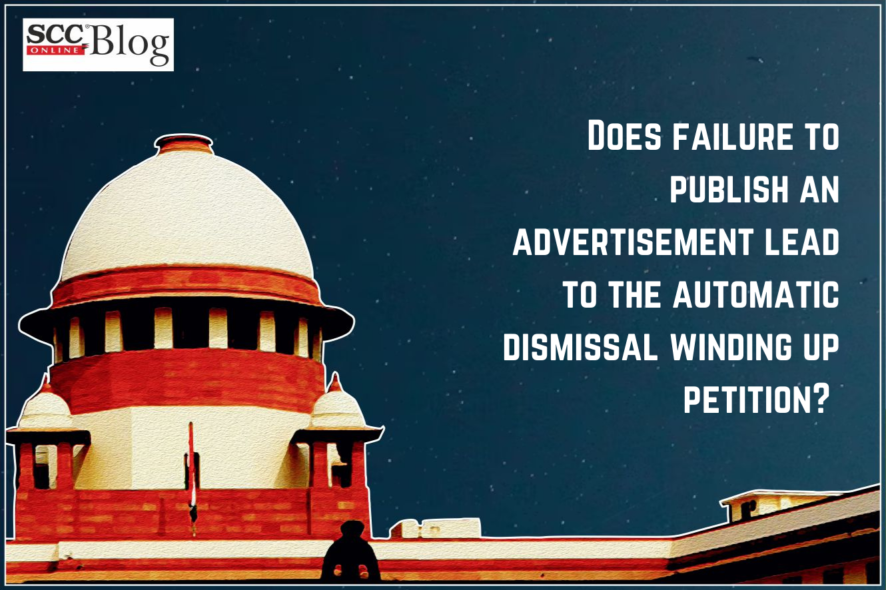Supreme Court: In the case where the bench of Hemant Gupta and V. Ramasubramanian*, JJ upheld NCLAT’s order of winding up of Devas Multimedia Private Limited, the requirement of advertising the winding up petition was looked into and the Court observed that the failure to publish an advertisement would not lead to the automatic dismissal of the petition for winding up.
Analysis
The Court analysed Rule 5 of the the Companies (Transfer of Pending Proceedings) Rules, 2016 which prescribes the procedure to be followed by the Tribunal, upon the filing of a petition for winding up.
What does Rule 5 state?
The step-by-step procedure prescribed in Rule 5 is as follows:-
(1) The petition should first be posted before the Tribunal for admission.
(2) The purpose of posting the petition for admission is threefold, namely,
(i) fixing a date for hearing of the petition;
(ii) issuing appropriate directions as to the advertisement to be published; and
(iii) indicating the persons upon whom the copies of the petition are to be served.
(3) On the date when the petition is posted for admission, the Tribunal may direct notice to be given to the company and also provide an opportunity of being heard before giving directions as to the advertisement of the petition.
What is the purpose of advertisement?
The Court noticed that the essence of Rule 5 is to provide an opportunity of being heard to the company sought to be wound up, even before directions as to the advertisement of the petition are given.
Two purposes:
- it provides an opportunity to all the stakeholders such as (i)creditors; (ii)workers; (iii) suppliers; (iv) customers; and (v) the general public, either to support or oppose the proceedings for winding up.
- it serves as a warning/notice or red alert to all those dealing with the company so that they know that there could be an element of risk in dealing with the company.
Explaining why an opportunity of being heard is contemplated in Rule 5, before ordering the advertisement of the petition, the Court said,
“After all, the winding up of a company is like the insolvency of an individual. The advertisement of the petition for winding up, not merely serves as an opportunity to support or oppose winding up, but also harms the reputation of the company and sends shock waves in the stock market, if it is a listed company or among the stakeholders who have dealings with the company.”
What happens in case of failure to publish an advertisement?
The Court went through a number of authorities where the Court took a view that advertisement is mandatory, not only in view of the prescription contained in the Rules, but also in view of the specific order passed by the Company Court at the time of admission, directing the publication of the advertisement in specified newspapers. The Court, however, observed that even in such cases the failure to publish an advertisement was not seen as something that would lead to the automatic dismissal of the petition for winding up.
“This is for the reason that the advertisement of a petition for winding up is perceived to be something that worked at cross purposes, sometimes beneficial to several stakeholders as it provides an opportunity of hearing to them and sometimes as a measure of harassment of the company. There are cases where the companies themselves have opposed the advertisement of the petition on the ground that the same would harm their reputation and cripple their commercial activities. There are also cases where the failure to advertise has led to some of the creditors not having any notice of the proceedings and thereby suffering prejudice.”
Was non-publishing of advertisement detrimental to the case at hand?
In the case at hand it was alleged that the petition for winding up of Devas was never advertised nor even ordered to be advertised, either upon the admission of the petition or anytime thereafter. It was therefore contended that the failure to comply with this requirement which is mandatory, vitiates the whole proceedings.
To know what the case was about, read this.
In the present case, there were no stakeholders who were prejudiced by the failure of NCLT to order the publication of advertisement of the petition.
Also, this was not a case where the company is sought to be wound up on the ground of inability to pay debts or on just and equitable ground. This was a case of fraud and all stakeholders were fully aware of the proceedings and they had even shown extreme urgency in enforcing an ICC Arbitration award and BIT awards, before the conclusion of the winding up proceedings.
Therefore, the Court rejected the argument that the failure of the Tribunal to order the publication of an advertisement rendered the entire proceedings unlawful.
[DEVAS Multimedia Pvt. Ltd.v. Antrix Corporation Ltd., 2022 SCC OnLine SC 46, decided on 17.01.2022]
*Judgment by: Justice V. Ramasybramanian
Counsels
For DEVAS: Senior Advocate Mukul Rohtagi,
For shareholder¬appellant: Senior Advocate Arvind P. Datar,
For Antrix: Additional Solicitor General N. Venkataraman
For UPI: Additional Solicitor General Balbir Singh







